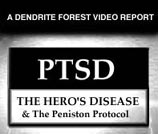Brief presentations of information on
aspects of PTSD:
- PTSD and Community Violence
- PTSD in Children
- PTSD and Problems with
Alcohol Use
- PTSD and Relationships
- PTSD and the Family
- Physical Health and
PTSD
- Survivors of Natural
Disasters
- Epdimological Facts About
PTSD --How
many people exposed to traumatic events have PTSD?
- Disaster and Rescue
Workers and PTSD
- Warning
Signs
Warning signs of trauma-related stress, from Los Angeles County Department of Mental Health.
- Warning
Signs from APA
Warning signs of trauma-related stress, from the American Psychological Assn.
- Victim Emotional Health
Emotional health issues for victims, from the American Red Cross.
- Coping
Suggestions
Coping suggestions, from Los Angeles County Department of Mental Health.
- Normalizing
Emotions
You are not alone! description of normal emotions following a disaster, from the American Red Cross.
-
Post-Traumatic Stress Disorder: An Overview" Matthew J. Friedman
The
Peniston Protocol
PTSD Treatment
You are not alone!
by the American Red Cross
There are some normal emotions we all experience caused by tragedy.
Many others who have had such experiences have found these feelings to be temporary.
Such normal negative feelings as we may suffer come in different stages.
- 1. Initially, we may go into a state of shock. We
feel numb and dazed. It helps to cope in this stage by keeping busy.
- 2. We may become anxious and panicky. Some common
signs are: nervousness, trembling, dizziness, inability to slow down
or relax, pounding heart, inability to concentrate, trouble breathing,
inability to sleep properly... It helps to admit that we have these
feelings and to talk to someone about them. It is very important to
re-establish routine activities, such as: regular meals, regular rest
breaks, brushing
teeth, bathing, shaving, etc.
- 3. Often times we may become angry. We are often bitter
about everything and irate at everyone. It helps to express this resentment
properly. We can channel this energy by keeping busy and focusing on
day-by-day plans.
- 4. We may become sad and blue. Most common signs of
this are: loss of appetite, fatigue, restlessness, hopelessness, worthlessness,
withdrawal, etc. It would help to keep in touch with other people and
remind ourselves that we are not alone.
- 5. We may become fearful for our own safety and future.
Many of these fears will go away with time once our lives have become
more normal and routine with the help of the community.
- 6. We may feel guilty about what has happened . . . wonder if we are responsible, feel awkward in receiving help, and believe we have not helped our neighbors enough.
The courage demonstrated by our communities is often a definite indication
that we will emerge from crisis. Certainly things will not be the same
-- in many ways the experience may make many stronger, through hope, faith
and combined community efforts.
The American Red Cross

